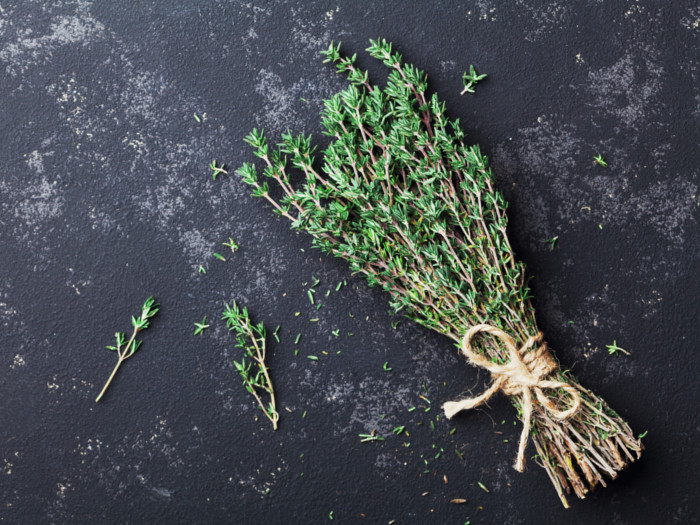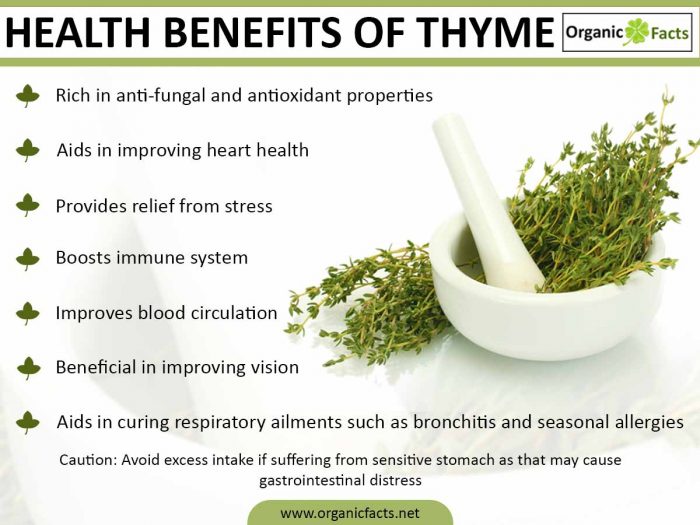It’s about ‘thyme’ we start talking about Thymus vulgaris, a pungent Mediterranean herb, belonging to the mint family. Known for its pungent taste, thyme is used to flavor a diverse range of foods, including poultry, meats, stuffings, sauces, fish, eggs, soups, vegetables, cheeses, and pasta. Additionally, its flowers, leaves, & oil are known for their medicinal properties and health benefits that include its ability to relieve stress, reduce respiratory issues, improve heart health, boost the strength of the immune system, stimulate blood flow, and prevent fungal infections. [1]
What is Thyme?
Thyme is an evergreen shrub that has been used in medicinal and culinary applications for thousands of years. It is known to have over 400 sub-species. This herb is native to the Mediterranean region and certain parts of Africa, and its use dates back to the Egyptian empire where it was used in embalming practices. The Greeks, on the other hand, used thyme as incense. The different forms of thyme include fresh and dried herbs and essential oil. You can either grow fresh thyme in your garden or buy it at the farmer’s market. You can get dried thyme and its essential oil at departmental stores, herbal medical markets, and e-commerce platforms like Amazon respectively. [2]
This article looks at the nutrition of thyme, its health benefits, and its different uses.
Thyme Nutrition
As per the USDA data, fresh thyme is rich in water, energy, fiber, sugar (a very low profile), and protein. It is also a good source of iron, calcium, phosphorus, magnesium, potassium, and sodium. It holds some important vitamins such as vitamin C, niacin, folate, vitamin A, beta carotene, vitamin K, and low quantities of thiamin, riboflavin, and vitamin B-6 too. [3]
Carbs in fresh thyme: A 100 gm serving of fresh thyme contains around 24.45 gm of carbs.
| Serving Size : | |
|---|---|
| Nutrient | Value |
| Water [g] | 65.11 |
| Energy | 101 |
| Energy [kJ] | 423 |
| Protein [g] | 5.56 |
| Total lipid (fat) [g] | 1.68 |
| Ash [g] | 3.2 |
| Carbohydrate, by difference [g] | 24.45 |
| Fiber, total dietary [g] | 14 |
| Calcium, Ca [mg] | 405 |
| Iron, Fe [mg] | 17.45 |
| Magnesium, Mg [mg] | 160 |
| Phosphorus, P [mg] | 106 |
| Potassium, K [mg] | 609 |
| Sodium, Na [mg] | 9 |
| Zinc, Zn [mg] | 1.81 |
| Copper, Cu [mg] | 0.56 |
| Manganese, Mn [mg] | 1.72 |
| Vitamin C, total ascorbic acid [mg] | 160.1 |
| Thiamin [mg] | 0.05 |
| Riboflavin [mg] | 0.47 |
| Niacin [mg] | 1.82 |
| Pantothenic acid [mg] | 0.41 |
| Vitamin B-6 [mg] | 0.35 |
| Folate, total [µg] | 45 |
| Folate, food [µg] | 45 |
| Folate, DFE [µg] | 45 |
| Vitamin A, RAE [µg] | 238 |
| Carotene, beta [µg] | 2851 |
| Vitamin A, IU [IU] | 4751 |
| Fatty acids, total saturated [g] | 0.47 |
| 8:0 [g] | 0.04 |
| 10:0 [g] | 0.02 |
| 12:0 [g] | 0.04 |
| 14:0 [g] | 0.03 |
| 16:0 [g] | 0.29 |
| 18:0 [g] | 0.05 |
| Fatty acids, total monounsaturated [g] | 0.08 |
| 18:1 [g] | 0.08 |
| Fatty acids, total polyunsaturated [g] | 0.53 |
| 18:2 [g] | 0.09 |
| 18:3 [g] | 0.45 |
| Tryptophan [g] | 0.11 |
| Threonine [g] | 0.15 |
| Isoleucine [g] | 0.29 |
| Leucine [g] | 0.26 |
| Lysine [g] | 0.13 |
| Valine [g] | 0.31 |
| Sources include : USDA [4] | |
Health Benefits of Thyme
Thyme is known for its numerous health benefits. Let’s take a detailed look at some of the prominent ones below.
Antifungal & Antibacterial Ability
The most active ingredient found in thyme is thymol. This organic compound has a wide range of effects on the body, including its ability to prevent fungal and viral infections, thereby reducing strain on the immune system, says a 2007 report published in the Journal of Food Safety. [5]

Thyme boasts of culinary, medicinal, and ornamental uses. Photo Credit: Shutterstock
Improves Skin Health
Traditional herbal treatments are common as far as maintaining and improving skin health is concerned. A study conducted in Ethiopia showed that a combination of a 3% thyme essential oil antifungal cream and a 10% chamomile extract cream helped clear eczema-like lesions on the skin. However, additional scientific research is required. [6]
Reduces the Risk of Respiratory Ailments
One of the most well-known and long-standing uses of thyme in traditional medicine is as a respiratory agent. If you are suffering from bronchitis, chronic asthma, congestion, colds, flu, blocked sinuses, or seasonal allergies, thyme acts as an expectorant and an anti-inflammatory substance. It eliminates phlegm and mucus from the respiratory tracts, eases inflammation to help breathe, and prevents microbial development that can lead to serious respiratory illness. That’s why brewing thyme into a powerful tea is one of the best ways to achieve relief from respiratory ailments. [7]
Antioxidant Capacity
With one of the highest antioxidant concentrations in any herb, thyme has been praised for thousands of years as an overall health booster. The phenolic antioxidants found in thyme, including lutein, zeaxanthin, and thymonin contribute to neutralizing and eliminating free radicals throughout the body, further inhibiting oxidative stress, according to a Korea Food Research Institute study. [8]
Improves Circulation
The high concentration of iron and other essential minerals in thyme makes it ideal for stimulating the production of red blood cells, thereby boosting blood circulation and oxygenation to the essential organ systems of the body. According to the USDA,100 grams of fresh thyme contains 17.45 mg, almost 20% of the recommended daily value of iron. [9] [10] [11]
Lowers Blood Pressure
There is a species of thyme known as Thymus Linearis Benth, predominantly found in Pakistan and Afghanistan, that is said to have the potential to lower blood pressure. According to a study published in Acta Poloniae Pharmaceutica Journal, the extract from this herb was able to considerably lower the blood pressure in rats, along with their cholesterol. Most people like to lower their intake of salt by substituting it with more of this herb in certain dishes. However, more scientific studies are required to ascertain the benefit of thyme on blood pressure. [12]
Protects Heart
The rich blend of antioxidants, minerals, and vitamins in thyme have many small effects on the heart, but potassium and manganese are particularly important. Potassium is a vasodilator, meaning that it can reduce the stress on the cardiovascular system by relaxing blood vessels and lowering blood pressure. [13]
A study in the UK found that laboratory rats whose diets were supplemented with thyme oil showed a stronger activity level and higher antioxidant levels during their lifespan. This can extend your life by preventing atherosclerosis and avoiding strokes, heart attacks, and coronary heart diseases. [14]
Eye Care
The concentration of carotenoids and vitamin A found in thyme makes it an effective antioxidant agent for your vision health. Carotenoids can neutralize the free radicals in your ocular system and slow the onset of macular degeneration and prevent cataracts. [15]
Boosts Immunity
The high levels of vitamin C found in this herb make it a natural immune system booster. Vitamin C stimulates the production of white blood cells, which are the first line of defense in the body’s immune system. According to a 2018 report published in the Phytotherapy Research, thymol is an essential component in the thyme essential oil that is known as an immunomodulator. [16]

Thyme is rich in antioxidants. Photo Credit: Shutterstock
Reduces Stress
One of the vitamins in thyme (B6) or pyridoxine has a powerful effect on certain neurotransmitters in the brain that are directly linked to stress hormones. Regular inclusion of thyme in your diet can help to boost your mood and ease your mind when stressful thoughts come calling. [17]
Uses of Thyme
Thyme is known for its culinary uses, courtesy of its distinctive flavor that is used to enhance the overall taste and gastronomical experience of the dish it is added to. Moreover, it is also known for its medicinal properties.
Culinary use: The stems and leaves of thyme are used in various dishes, either in whole or dried form. It is usually added to soups, sauces, meat dishes, or used as a flavorful garnish. The leaves can be removed from the stems and ground into a fine spice, or the entire sprig can be added to flavor a larger dish or stew.
Some of the recipes that have used thyme are:
- Thyme Tea: Benefits & How To Make It
- Perfect Roast Chicken Recipe
- Gourmet Lebanese Shish Tawook Recipe
In case you don’t have the herb at home and need to use it urgently for a recipe, here are 6 Amazing Substitutes For Thyme that will come to your rescue.
Medicinal properties: They can also be brewed into a tea and a decoction can be made with carrier oils or creams to apply topically to the body to improve skin health and blood flow among other things.
Word of Caution: For those with a sensitive stomach, a high intake of thyme can cause gastrointestinal distress. Having said that, this herb is not known as an allergenic substance and can be consumed regularly in your diet.
